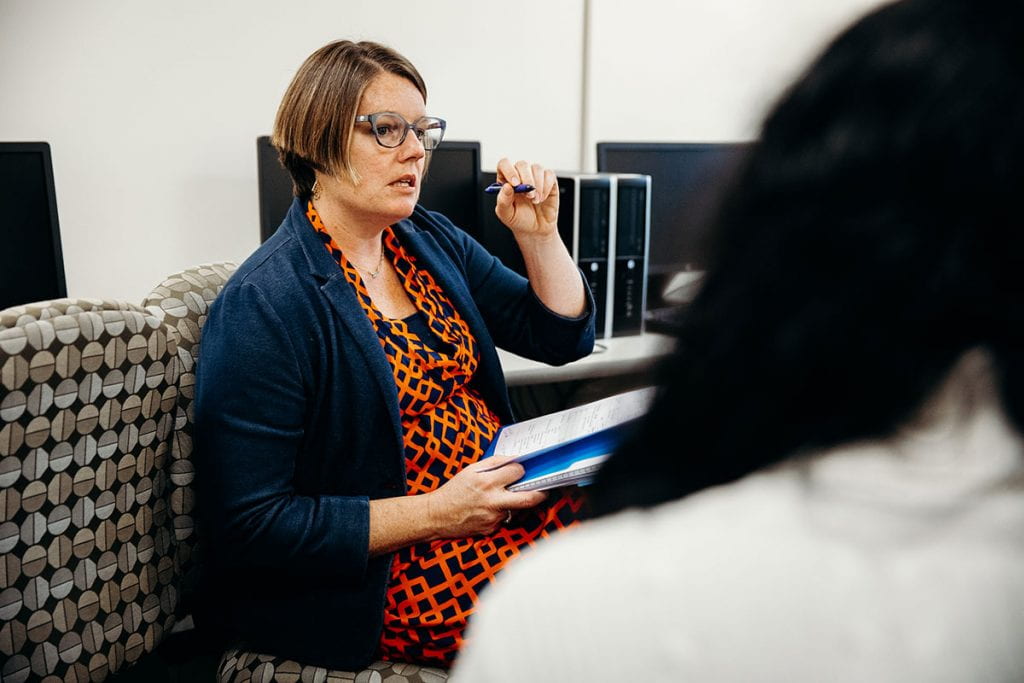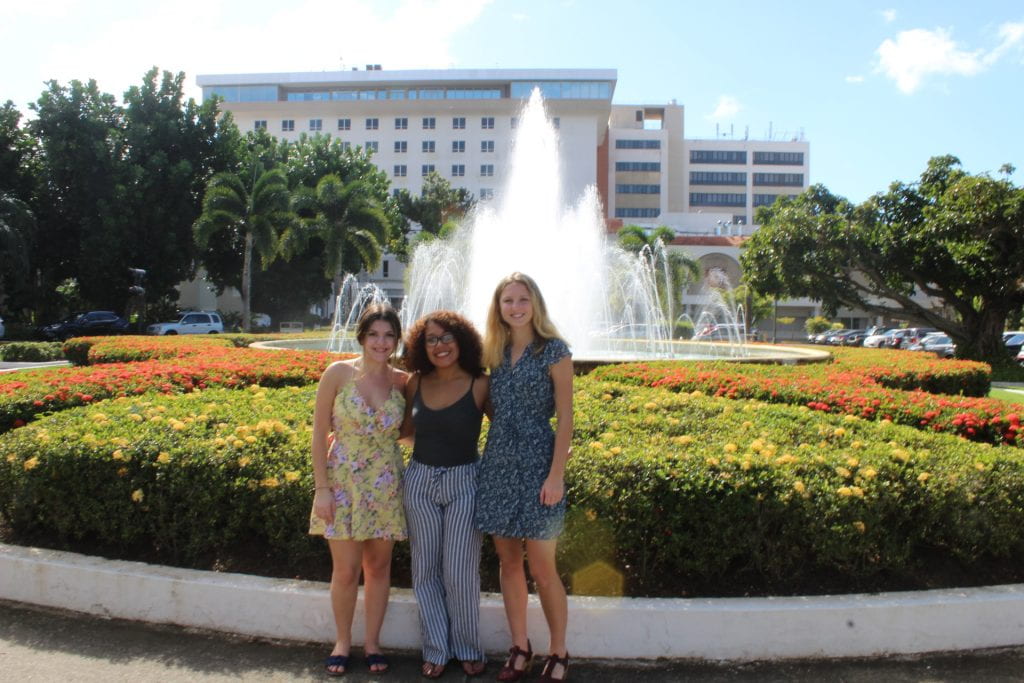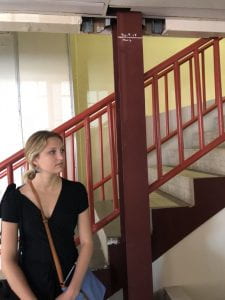HPM professor awarded NSF grant to research ethics in disaster care
By Charlotte Smith ’20, ’21G
Dr. Jessica Mulligan, professor of health policy and management, has earned a collaborative research grant award from the National Science Foundation for a project titled “Ethics of Care and Compounded Disaster.”
This marks the first large-scale, federal research award made to a faculty member in the Department of Health Policy and Management. This is also the first NSF award that the School of Professional Studies has received. NSF is highly competitive, typically funding less than 25% of submitted proposals.
The Ethics of Care project will be undertaken in conjunction with co-investigator Dr. Adriana Garriga-López at Kalamazoo College in Michigan. Each school was granted a separate but linked award to work together on this 36-month undertaking, which officially started on March 1, 2021. Providence College received $173,048 and Kalamazoo $129,344.

The project will document how health care workers respond emotionally to major disasters, care for patients during health emergencies, and work to rebuild health and strengthen care systems. The research is significant, as the frequency and severity of natural disasters and the attendant health emergencies that ensue are on the rise globally. Therefore, gathering data on how the health care workforce responds to prolonged crisis conditions can aid in designing more effective responses to these inevitable realities, according to Mulligan.
“Ethics of care” refers to the practices and self-understanding that guide and motivate those who work caring for others.
“We are interested in how health care workers are responding emotionally to multiple disasters. One of our main goals is to understand what motivates and inspire them to keep doing the work that they’re doing,” said Mulligan.
The focus of this project is disaster recovery in Puerto Rico, whose infrastructure was devastated by Category 4 Hurricane Maria in 2017 and which still operates under conditions of sustained emergency. In fact, Puerto Rico was still struggling to recover from Hurricane Maria at the outset of the COVID-19 pandemic. The project explores whether the ethics of health care provisioning transform under conditions of “compounded disaster.” The project’s central research question is, “Did health care workers’ experiences during and after Hurricane Maria transform their ethics of care?”
This project represents several years of effort to gather preliminary data, conduct pilot work, apply for funding from various internal and external sources, and incorporate feedback from peer reviewers. After Hurricane Maria struck, Mulligan and Garriga-López were moved by how much work was being done on the ground by health care providers, local volunteers, and mutual aid organizations to try and meet the needs of those who were affected by its vast reach. While the project started out with some pilot research funded through smaller grants, the project kept growing, and Mulligan was eventually able to bring students to Puerto Rico in December 2018.
“I have a longstanding interest in the health care system in Puerto Rico,” she said. “Initially, I was interested in finding out the challenges health care workers were facing, and how they were rebuilding the health care system after the hurricane. As the project began picking up steam, I was able to involve several PC students, who were able to travel to various parts of Puerto Rico.”

Mulligan will direct several more undergraduate students in conducting research throughout the life of the project.
Data collected through the project’s work thus far indicates that instead of feeling discouraged or burnt out after Hurricane Maria, health care workers feel committed to performing heroic acts to care for the sick and injured. Mulligan and the rest of her research team are hoping to use data to argue that in order to effectively rebuild a health care system, local involvement with individuals in affected areas is critical in providing relevant solutions to the most prominent issues. This includes ensuring money is allocated properly, which is often better assured when efforts are controlled at a local level, she said.
“Students have been involved in every part of the research process. This includes grant writing, working with ethical review boards, devising interview questions and focus group protocols, conducting interviews, analyzing data, and writing up results. Eventually, they will be co-authors on publications emanating from the project. Students are also collaborating with Kalamazoo College students in their investigations,” Mulligan said.

“There is an overwhelming narrative in U.S. media and political circles that there is too much corruption in Puerto Rico,” said Mulligan. “In response, federal agencies have promulgated punitive and harmful restrictions on relief programs that have prevented federal dollars that have been allocated for relief from being spent.
“In our research we found that ordinary people sprang into action to participate in and run relief efforts in their communities and across the archipelago of Puerto Rico. Though corruption is certainly an issue — as it is pretty much everywhere — we found that Puerto Rican health care workers joined in to repair the damage from Hurricane Maria, and they are also currently on the front lines against COVID.”
It is important to her and the project to continue to create opportunities for training undergraduate researchers. As the coordinator of undergraduate research at PC, she is a firm believer that students can create knowledge and should be involved in these kinds of academic-oriented endeavors throughout their undergraduate education.
Jailene Vázquez ’22 (Boston, Mass.) has spent two semesters working on the project alongside Mulligan. This year, her research has switched towards finding out how the COVID-19 pandemic has affected the island. Vázquez is working with other PC students to see if similar themes are emerging from COVID-19 as were those that emerged after Hurricane Maria.
“Student teams have worked on coding interviews and finding key themes and keywords that led us to our conclusions,” she said. “This semester, we have all helped draft materials to be sent to PC’s Institutional Review Board to get them approved, because we are working with human subjects — interviewees. I am also in contact with a translator, since we send all of our interview materials to be translated before they are analyzed.”
Not only has the grant award from the NSF allowed students and faculty to create better methods of outreach for the project, but it will also fund another trip to Puerto Rico this summer, if COVID guidelines allow.
“While the initial findings of this project have uncovered a wealth of knowledge on the exponential impact of compounded disasters on communities, the hope is that the information learned will ultimately allow for substantive changes to how relief programs are implemented,” said Mulligan. “By compiling our findings and making them available to decision-makers, we hope that in the next disaster relief agencies will make better use of the logistical knowledge and know-how of local health care workers.”
Vázquez added that, from a personal research standpoint, the project has been an extremely relevant and rewarding educational experience.






